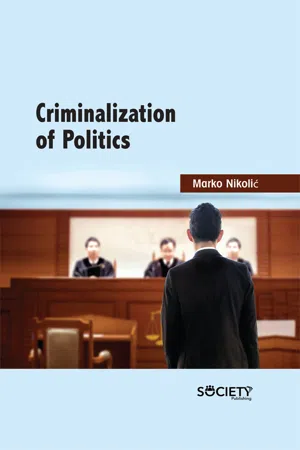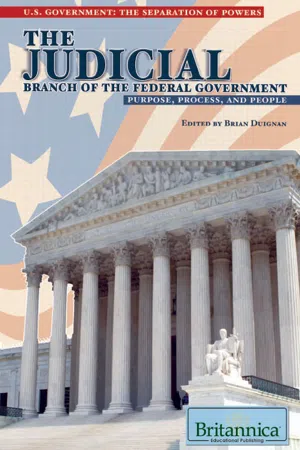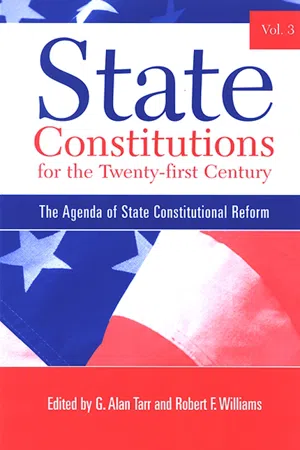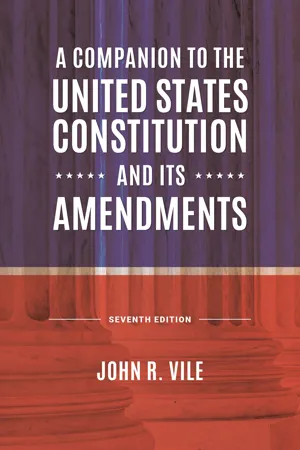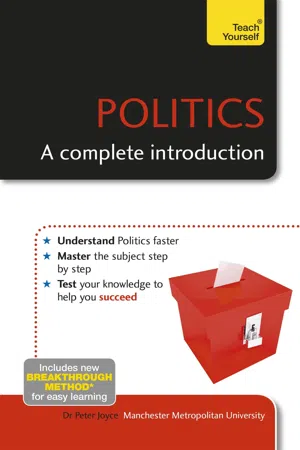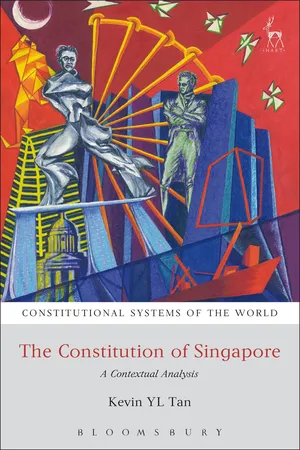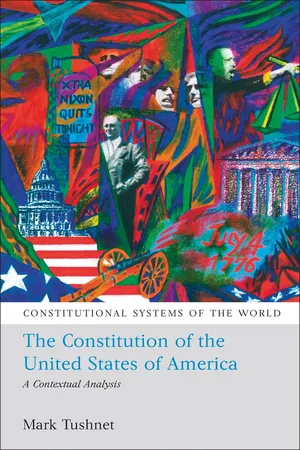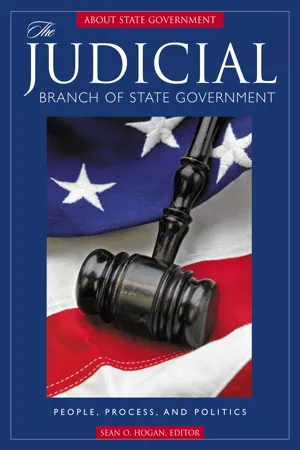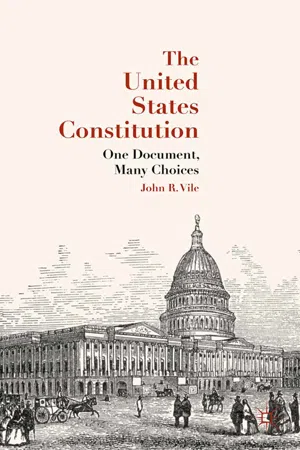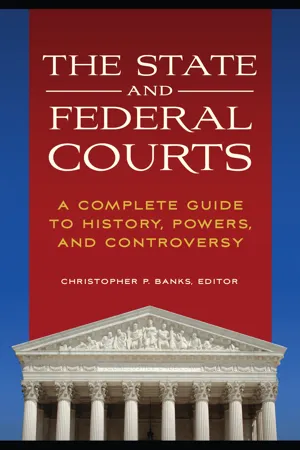Politics & International Relations
Judicial Branch
The judicial branch is one of the three branches of government, responsible for interpreting and applying the law. It consists of the court system, including the Supreme Court, and plays a crucial role in upholding the Constitution and ensuring the fair administration of justice. The judiciary's independence is essential for maintaining the system of checks and balances within a democratic government.
Written by Perlego with AI-assistance
Related key terms
1 of 5
10 Key excerpts on "Judicial Branch"
- eBook - PDF
- Marko Nikoli?, Marko Nikolić(Authors)
- 2020(Publication Date)
- Society Publishing(Publisher)
Usually, the legislative branch does the funding in such cases and the orders are carried out by the executive branch. It is said that the courts (or judiciary) possess neither the power of the sword nor the power of the purse. Hence, the judiciary is known to be the least dangerous branch of government. In reality, enforcement of the orders of any government institution depends on the enforcing institution’s acceptance of the issuing institution’s right to make the ruling and to have it enforced. 4.2. THE CONCEPT OF JUDICIAL INDEPENDENCE As the term ‘judicial independence’ denotes it means that, the judiciary should be independent from the other branches of government. The role of judicial independence in a liberal republican democracy is to protect political and civil rights and also the rule of law. There are three most significant components of the Judiciary. The very first is utility, and efficiency. For this, courts must be useful to its people where court is expected to lawfully punish the culprit, protect civil rights and privileges, and justly resolve disputes. Court is also expected to be efficient in all their work, thereby not causing any waste and delay, as this would result in less political support. Insulation and accountability are the second component (Figure 4.2). Criminalization of Politics 90 Figure 4.2: The decisions taken by the judges have a great impact on the politi-cal consequences of a state. Source: Image by Flickr. This means that the courts are politically insulated to the executive, legislature, and political parties. Also, no social, economic, or political power can influence the court’s decision. Moreover, the court is accountable for its actions and decisions to the laws, constitution, and its people. Lack of accountability will take away the public’s trust towards the courts and will encourage other political bodies to take an advantage of unaccountability and exercise its control. - eBook - ePub
The Judicial Branch of the Federal Government
Purpose, Process, and People
- Britannica Educational Publishing, Brian Duignan(Authors)
- 2009(Publication Date)
- Britannica Educational Publishing(Publisher)
HE JUDICIAL BRANCH OF GOVERMENTTHE JUDICIARY IN PERSPECTIVE
The judiciary is the branch of government whose task is the authoritative adjudication of controversies over the application of laws in specific situations. Conflicts brought before the judiciary are embodied in cases involving litigants, who may be individuals, groups, legal entities (e.g., corporations), or governments and their agencies. Conflicts that allege personal or financial harm resulting from violations of law or binding legal agreements between litigants—other than violations legally defined as crimes—produce civil cases. Judicial decisions in civil cases often require the losing or offending party to pay financial compensation to the winner. Crimes produce criminal cases, which are officially defined as conflicts between the state or its citizens and the accused (defendant) rather than as conflicts between the victim of the crime and the defendant. Judicial decisions in criminal cases determine whether the accused is guilty or not guilty. A defendant found guilty is sentenced to punishments, which may involve the payment of a fine, a term of imprisonment, or, in the most serious cases in some legal systems, stateimposed physical mutilation or even death.Judiciaries also frequently resolve administrative cases, disputes between individuals, groups, or legal entities and government agencies over the application of laws or the implementation of government programs. Most legal systems have incorporated the principle of state sovereignty, whereby governments may not be sued by nonstate litigants without their consent. This principle limits the right of litigants to pursue remedies against government actions. Nevertheless, the right of citizens to be free from the arbitrary, improper, abusive application of laws and government regulations has long been recognized and is the focus of administrative cases. - eBook - PDF
State Constitutions for the Twenty-first Century
The Agenda of State Constitutional Reform
- G. Alan Tarr, Robert F. Williams, G. Alan Tarr, Robert F. Williams, Robert F. Williams(Authors)
- 2012(Publication Date)
- SUNY Press(Publisher)
In serving that interest, judicial independence also promotes public confidence in the integrity of the Judicial Branch. 4 • Institutional Independence (Autonomy) of the Judicial Branch: Comple- menting decisional independence of the judiciary is institutional inde- pendence or autonomy. Separation-of-power principles require recognition of the autonomy of the Judicial Branch as a coequal part- ner in state government. This means that the Judicial Branch, like the other branches of state government, must have the authority to govern and manage its internal affairs, free from undue interference by other branches of government, although not free from the scrutiny of those branches or of the public. • Effective Delivery of Judicial Services: State judicial systems must be struc- tured, organized, and managed so that they ensure access to justice for all citizens and provide for the expeditious and cost-effective administration of justice. • Accountability of the Judiciary: The American system of government embraces the notion of accountability for public officials in order to prevent corruption or other abuses of power and to ensure that gov- ernmental policy reflects the values and interests of the community. This underlies the creation of a system of separate institutions sharing power to ensure checks and balances and the establishment of mech- anisms for public scrutiny of the performance of government officials. Like the other branches of state government, the judiciary too must be accountable. With respect to the judiciary, two different types of accountability can be distinguished. With regard to their decisions, judges must be accountable to the law, i.e., their rulings must be con- 86 THE Judicial Branch sistent with the law. For trial court judges and lower appellate court judges, this accountability is enforced in part within the Judicial Branch through appellate review of judicial decisions. - John R. Vile(Author)
- 2021(Publication Date)
- Praeger(Publisher)
Article III is short, but it serves as the basis for one of the world’s most powerful judiciaries. The framers created an outline and allowed Congress to fill in structures and powers as necessity required. Although the framers assured judges considerable independence from day-to-day political pressures by granting them tenure “during good behavior” and prohibiting Congress from cutting their salaries, the system of judicial appointment and confirmation, and the possibility that congressional and state majorities can reverse judicial decisions through constitutional amendments, continue to subject judges to checks and balances.SUMMARYArticle III created the Judicial Branch, which currently consists of two sets of lower courts (district and circuit) headed by a Supreme Court. All federal judges and justices are appointed by the president with the advice and consent of the Senate and serve “during good behavior.” Article III describes cases that come to the Supreme Court based on their subject matter and on the basis of the parties to the suits. The Supreme Court chiefly exercises appellate jurisdiction over cases that are appealed from the highest courts of the states or from lower federal courts. American courts exercise the power of judicial review, enabling them to invalidate unconstitutional laws in cases that come before them, and statutory interpretation, through which they interpret the laws. In contrast to members of the other two branches, members of the judiciary cannot initiate cases but have to wait for issues to get to them by parties who establish standing and can show that they are bringing a real case or controversy to the Court.FOR REFLECTION AND DISCUSSION- One of the primary differences between the Judicial Branch and the legislative and executive branches is that the members of the former are appointed and confirmed rather than elected. Some states, however, have a system in which the electorate plays a part in selecting judges. Why do you think the framers constructed the federal judiciary as they did?
- Peter Joyce(Author)
- 2015(Publication Date)
- Teach Yourself(Publisher)
‘Judicial review in the UK comprises an assessment of a decision made by a public body (which includes government departments, local authorities, tribunals. Or any other organization that exercises a public function …)… The basis on which judicial intervention is founded is the doctrine of ultra vires which suggests that a public body has acted beyond its authorized limits … In countries that possess codified constitutions, the judiciary are responsible for ensuring that the constitution is upheld. Senior courts (such as the American Supreme Court or the French Conseil Constitutionnel) perform this function’ (Joyce and Wain, 2010: 112–113).Joyce, P. and Wain, N. (2010) A Dictionary of Criminal Justice. London: Routledge.However, in the UK, the 1998 Human Rights Act provided the judiciary with the ability to warn parliament that a piece of legislation was contrary to the European Declaration of Human Rights. The Courts were not able to annul or strike down legislation that they considered to be contravening the Declaration but, instead, were able to issue a Declaration of Incompatibility which urged the government and parliament to reconsider the issue. We considered this matter in Chapter 9 .Judicial interpretation
The role of judges may sometimes extend beyond administering the law and entail them determining its content. This is known as judicial law making (or judicial activism).Key idea (4) THE STRICT LETTER OF THE LAWIn theory, the role of judges is to apply the law to the matter that comes before them. However, it is often argued that judges go beyond this role and effectively determine its contents, which are subsequently binding on courts dealing with similar cases. This situation arises as a result of judicial interpretation of such documents that may effectively give judges the ability to act in a law-making capacity. Judges differ, however, in the principles which they apply when interpreting the law or constitution. These are now discussed.Some judges rigidly apply the wording of the statute or constitution to the case that is before them. The judge’s interpretation, therefore, is little more than the citation of existing sources as the basis for the decision which they reach. A case is determined according to the strict letter of the law. This strict interpretation view of the role of the judiciary tends to promote a conservative approach to judicial interpretation. It suggests that issues that are not contained in a country’s law or constitution cannot be inserted into it by judges. Those who endorse such a view regard this as either the work of legislators or as a matter which should be responded to by the process of constitutional amendment.- eBook - PDF
The Constitution of Singapore
A Contextual Analysis
- Kevin YL Tan(Author)
- 2015(Publication Date)
- Hart Publishing(Publisher)
The judiciary’s role in maintaining law and order according to the Constitution is crucial if the democratic sys-tem of government is to function properly. It is the judiciary which is empowered under the Constitution to check on the arbitrary use of power and administrative abuse through the exercise of its judicial power. II. JUDICIAL POWER: MEANING, NATURE, CONTENT AND SCOPE Any study of the judiciary and its powers must begin with an under-standing of the meaning, nature, content and scope of ‘judicial power’, 1 Act 24 of 1969. 2 Judicial Committee (Repeal) Act, No 2 of 1994. Judicial Power 149 as distinct from ‘executive power’ or ‘legislative power’. Article 93 of the Constitution provides that the ‘judicial power shall be vested in a Supreme Court and such subordinate courts as may be provided by any written law for the time being in force’. The significance of this vesting of judicial power and the ambit of this power was considered in the High Court case of Mohammad Faizal bin Sabtu v Public Prosecutor . 3 The petitioner in this case (Mohammad Faizal) had been charged with one count of consuming morphine under the Misuse of Drugs Act. 4 As he had been admitted to a drug rehabilitation facility on two previous occasions, the law mandated a minimum mandatory punish-ment to be meted out on him, as a repeat offender. He argued that this mandatory provision violated the principle of the separation of powers since the legislature required the judiciary to impose a mandatory mini-mum sentence on him. In the course of deciding the case, Chief Justice Chan Sek Keong made some important observations about the meaning of Article 93 and ‘judicial power’. The Chief Justice started off by considering the nature of the Westminster model of constitutional government and noted that under the Singapore Constitution, ‘the sovereign power of Singapore is shared among the same trinity of constitutional organs’ as that of the United Kingdom (UK). - eBook - ePub
The Constitution of the United States of America
A Contextual Analysis
- Mark Tushnet(Author)
- 2008(Publication Date)
- Hart Publishing(Publisher)
4
The Constitutional Politics of the Judicial Branch
The US Supreme Court is at the top of a hierarchically organized, though somewhat complex, judicial system. There are two sub-systems of courts: one in the states and the other for the national government.1 The courts in the national judicial system are usually called the federal courts. State courts and the lower level federal courts have trial-level courts and appellate courts.2 Most American courts are generalist courts, with jurisdiction over claims of any sort.3 The US Supreme Court, on which this chapter focuses, has discretionary authority to hear appeals from decisions on matters of national law—statutory as well as constitutional—by the appellate courts in the national court system and by the highest state court authorized to decide the question of national law. Usually, but not always, that court is the state’s supreme court: in one notable case the US Supreme Court heard an appeal from a decision by the Police Court of the city of Louisville, Kentucky, which had imposed a small fine on the defendant, because under state law there were no appeals from such courts when small fines were imposed.4 - eBook - PDF
The Judicial Branch of State Government
People, Process, and Politics
- Sean O. Hogan(Author)
- 2006(Publication Date)
- ABC-CLIO(Publisher)
The books explain how each branch of state government has changed over time, what roles the three branches play in state politics, how the three branches are structured, who serves in them, and how these individuals are selected. The books also describe the character of politics in the states today, the relationship among the different branches of government, some of the major problems confronting state government, and modern proposals for political reform. Each volume also includes a lengthy chapter providing information on the governments state by state, including a description of how each state government is structured, an overview of how the elected officials are selected, Page xvi and some insights into the character of politics in each state. All three books include a glossary of terms, a comprehensive index, and an annotated bibliography to provide direction for further study. This set will not make everyone in the nation as familiar with state government as they are with the federal government. But it should provide a good starting place for those who have questions about government in the nation’s fifty states and are looking for a book to provide them with answers. Richard A. Clucas, Set Editor Portland State University Page xvii PREFACE AND ACKNOWLEDGMENTS Though often described as “the least dangerous branch,” the judiciary plays a significant role in state government. Moreover, state courts are at the cutting edge of many of today’s most contentious social issues such as gay marriage, cessation of medical care for the terminally ill, liability reform, law enforcement powers, and business regulation. Like other state governing institutions, though powerful, state courts are subject to a variety of limitations. Many of these limits are spelled out in constitutions, state law, and tradition. The limits on courts also are the result of the selfrestraint exercised by judges themselves, the influence of interest groups, and the process of selecting judges. - eBook - ePub
The United States Constitution
One Document, Many Choices
- J. Vile(Author)
- 2015(Publication Date)
- Palgrave Macmillan(Publisher)
Chapter Four The Judicial Branch: It’s a Group of Lawyers, Not Platonic GuardiansArticle III of the US Constitution has fewer sections (three) and is far briefer than the two articles that preceded it. Whereas the first two articles describe the elected branches, Article III outlines an appointed branch that is further removed from the people. Rather than hash out all the details of this branch, the Framers left many of the issues for the first Congress to resolve. Full understanding of the Judicial Branch thus requires as much knowledge of the Judiciary Act of 1789 and subsequent acts of congressional legislation as of the Constitution itself.How Many Federal Courts Should There Be and How Should They Be Organized?When the Framers wrote the US Constitution, they believed that the number of legislators would have to grow as did the number of individuals whom they represented. Similarly, they believed that concentrating executive power in a single set of hands would increase the “energy” and effectiveness of the office. They seemed less certain about the size of the federal judiciary. This stemmed from two factors. First, aside from agreeing on the need for at least one Supreme Court, they disagreed among themselves as to the need to create federal courts rather than relying upon existing state bodies. Second, they wanted to leave room for greater specialization as the nation grew. - eBook - ePub
The State and Federal Courts
A Complete Guide to History, Powers, and Controversy
- Christopher P. Banks(Author)
- 2017(Publication Date)
- ABC-CLIO(Publisher)
In theory, procedural rules are in place because they supply key information to litigants and attorneys about how to start and keep legal actions on the docket. In practice, however, the uneven development of the rules of judicial procedure in individual federal and state courts across the country has unintentionally transformed them into significant barriers to judicial access because they are complex, confusing, and ambiguous for anyone who tries to apply them. Accordingly, litigants wishing to use the courts to resolve their legal disputes may be shut out of the judicial process because it is too costly, time-consuming, or complicated in litigation to comply properly with rules of process. Moreover, even if the procedural rules are understood and applied correctly to legal actions, courts and judges retain the discretion to decide their scope and application in legal disputes. By exercising their discretion courts and judges not only manage their dockets, but they also may determine as a threshold matter whether courts have the jurisdictional authority to resolve their legal affairs in various stages of the litigation contest. As a consequence, jurisdictional rules greatly affect whether litigants can successfully settle their own legal matters but also use the courts as agents for creating significant legal and public policy change.Christopher P. BanksSee also: Adverseness and Advisory Opinions ; Constitutional Interpretation ; Judicial Activism and Restraint ; Judicial Review ; Public Access to CourtsFurther ReadingBarak, Aharon. 2008. The Judge in a Democracy . Princeton, NJ: Princeton University Press.Bickel, Alexander M. 1961. “The Passive Virtues.” Harvard Law Review 75: 40–244.Bickel, Alexander M. 1962. The Least Dangerous Branch: The Supreme Court at the Bar of Politics . Indianapolis, IN: Bobbs-Merrill Company.Chemerinsky, Erwin. 2012. Federal Jurisdiction . New York: Wolters Kluwer Law & Business.Doyle, Kelly R., ed. 2015. Constitutional Inquiries: The Doctrine of Constitutional Avoidance and the Political Question Doctrine . New York: Novinka.Hershkoff, Helen. 2001. “State Courts and the ‘Passive Virtues’: Rethinking the Judicial Function.” Harvard Law Review 114: 1833–1940.Mourtada-Sabbah, Nada, and Bruce E. Cain, eds. 2007. The Political Question Doctrine and the Supreme Court of the United States . Lanham, MD: Rowman & Littlefield Publishers.CasesBond v. United States (Bond I) . 2011. 564 U.S. 211.Bond v. United States (Bond II) . 2014. 134. S.Ct. 2077.Bush v. Gore . 2000. 531 U.S. 98.Campbell-Ewald Co. v. Gomez . 2016. 136 S.Ct. 663.Marbury v. Madison . 1803. 1 U.S. 137.Renne v. Geary . 1991. 501 U.S. 312.JUDICIAL INDEPENDENCEAn indispensable feature of the American constitutional system of government is preserving the judiciary’s capacity to render impartial legal judgments without fear of retribution or retaliation by the political branches. The concept of judicial independence, which is crucial to sustaining judicial sovereignty and respect for the rule of law, was built into the constitutional framework by the framers at the time of the nation’s founding. As the power and influence of the judiciary has grown through its exercise of judicial review, the reality is that neither the federal nor state courts can remain completely independent or free from political pressures. Most federal judges are appointed to the bench, so their tenure is not dependent upon the vagaries of popular elections. Also, because of certain constitutional protections federal judges are better situated to withstand political attacks from the legislative or executive branches. Even so, the independence federal courts enjoy is complicated by the problems caused by so-called counter-majoritarian difficulty —most federal judges are not directly accountable to the people through elections because they are appointed for life. In contrast, most state judges are elected into office and face a majoritarian difficulty
Index pages curate the most relevant extracts from our library of academic textbooks. They’ve been created using an in-house natural language model (NLM), each adding context and meaning to key research topics.
